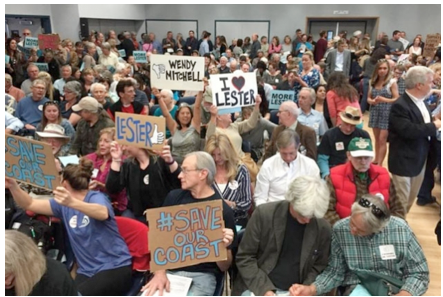CommentsHERE’S WHAT I KNOW-Last Wednesday, the Coastal Commission fired executive director Charles Lester, voting seven to five in a closed-door session, despite the supportive testimony of over 200 people who opposed his dismissal and hardly any in favor of firing him.
Lester’s firing marks the very first in the commission’s 44-year history. The panelists explained away the closed sessions, stating Lester had not waived his privacy rights related to confidential personnel evaluations.
Just how did the California Coastal Commission go from the standard-bearer of protecting the coastline to firing a longtime executive director behind closed doors?
Following his dismissal, Lester characterized the commission’s actions as seeming to be “more interested in and receptive to the concerns of the development community, as a general rule.” The executive director expressed concern over the future of the commission.
The commission denies that the firing had anything to do with coastal development but with Lester’s managerial problems, staff communications, and his fairness towards applicants but that’s not how the environmental community seems to see things. Former coastal commissioner Steven Blank predicted the firing will elicit a strong response from environmental groups, as well as Californians.
“On the downside, it’s a tragic loss for all Californians, but it will be a lightning rod for the coast,” assessed the former commissioner who served on the commission from 2007 to 2013. “This has been a civics lesson for the public in how regulatory bodies get captured by developers.”
When Lester took over the agency in 2011, approximately half the commissioners had been on the panel for less than a year. He claimed that the newly impaneled commissioners seemed to be more ensconced in what was traditionally the domain of staff, including new hires, agendas, budgets, and meeting locations. Lester says some of the commissioners were complaining about how long it would take to get projects through the pipeline, developments like Newport Banning Ranch, a controversial project including hundreds of residences on a 401-acre parcel that is the largest remaining privately held plot of coastal land in Orange County.
Lester and his staff supported denying the project, citing that building homes would destroy the environmentally sensitive habitat; the project goes before the panel next month. Lester sees his dismissal as more complicated than a fight between environment vs. development and is concerned about the future of the commission should he be replaced with someone more open to the suggestions of commissioners and developers.
“Unless the political system in California recommits to the spirit and intent of the Coastal Act, it may be a fundamental shift in direction,” he says. “This is a powerful land use agency, there’s a lot at stake and there are vested interests that want things done.” The agency’s staff, he charges, must be independent and separate from political appointees in order to maintain impartiality.
Lester’s firing lacks transparency and the commission’s issues with Lester might be construed as a means towards a “changing of the guard.” Even if the commission should choose a new executive director who is a steward of the environment and a protector of coastal rights for all Californians, the perception will remain that the commission seems focused on becoming more powerful than the executive director and staff.
During his tenure, Lester strongly advocated for environmental concerns and the rights for all Californians to enjoy our uninterrupted coastline. Sure, he made some enemies in his fight to ensure coastal access for all in places like Carbon Beach. Developers stand to make billions of dollars should the coastline be open to further development. An executive director like Lester can be viewed as a means to maintain a balance of powers, preventing the commission from making decisions on behalf of developers and not in the best interest of the environment or our citizens.
We need to take a close look at what’s next.
(Beth Cone Kramer is a Los Angeles-based writer and writes for CityWatch.) Photo: LA Times. Edited for CityWatch by Linda Abrams.
















